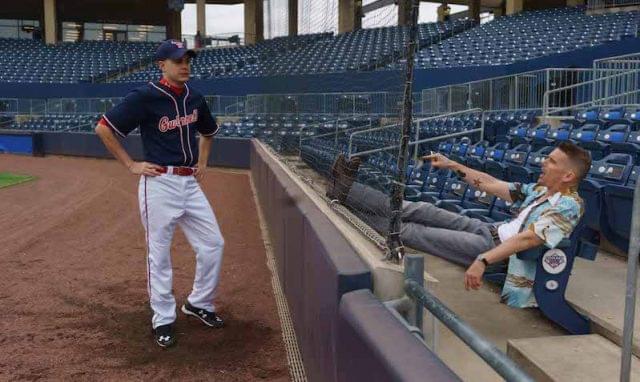
As “The Phenom” demonstrates, pitching is all about focus. So is filmmaking, for that matter, a fact also demonstrated by this mature, sure-footed drama about a hot young pitcher trying not to crack under the pressure. Writer-director Noah Buschel isn’t a rookie — this is his sixth feature, though almost certainly the first one you’ve heard of — but he brings both a youthful passion and a veteran’s control to the story.
We meet rookie phenom Hopper Gibson (Johnny Simmons) during his first session with Dr. Mobley (Paul Giamatti), a sports psychologist who was brought in after Hopper, once the nation’s top pitching prospect, inexplicably threw five wild pitches in a single inning and was sent back to the minors. Through extended flashbacks and a dreamy, often disorienting attitude toward chronology, Buschel follows Dr. Mobley into Hopper’s past to find out what’s holding him back.
The prime suspect is Hopper’s dad, Hopper Sr. (Ethan Hawke), himself a former baseball star who flamed out in high school when drugs and girls became more appealing than self-discipline. Now a heavily tattooed, buzzcut-wearing ex-con, schemer, and general layabout, Senior wanders back into his son’s life when the latter is in his final year of high school. Hopper’s teacher, Ms. Epland (Elizabeth Marvel), who knew Senior when they were both students at this same school, urges Junior to keep studying and warns him not to fall into his dad’s habit of cutting corners.
What Ms. Epland doesn’t understand, and what Hopper’s girlfriend, Dorothy (Sophie Kennedy Clark), can’t grasp is that Hopper is different. Dorothy asks if he thinks being able to throw a ball a hundred miles an hour really makes him special, and while her question is rhetorical, Hopper’s answer is basically: Well, yeah. How can he concentrate on school when he has scouts recruiting him, urging him to skip college and go right to the big leagues? How can he be a sensitive boyfriend when he’s under so much pressure to perform on the field? How can he do any of it with his dad, an emotional bully who’s unhealthily invested in his son’s success, breathing down his neck all the time? He’s beaten it into Hopper’s head that you never show emotion on the mound — and that you’re always on the mound.
It’s probably obvious that this story of a pitcher working out his issues with a sports psychologist is more about psychology than sports. But while Buschel only shows Hopper on the mound a few times, he doesn’t skimp on the element of baseball that many people find most satisfying: talking about baseball. It’s a very conversation-oriented film, actually, almost theatrical in the way it favors discussion over physical action. Never in a hurry, Buschel lets each scene play out casually, for as long as it needs to. He’s also shrewd enough to employ a few cinematic tricks like point-of-view shots and unbroken takes to keep things interesting visually. Each shot seems to have been composed carefully, even when there’s no movement in it, drawing us in to the drama.
It helps to have good actors, of course. Paul Giamatti (whose father was MLB commissioner in 1989) is a welcome, calming presence as the shrink, especially when the story moves into its “Good Will Hunting” section. Ethan Hawke plays against type as a damaged, pathetic wreck who serves as a cautionary tale for his son. And Johnny Simmons acquits himself very well, too, summoning raw emotion as the vulnerable Hopper. This is a thoughtful, introspective sports drama that suggests Noah Buschel, like Hopper, may have greatness in him.
B (1 hr., 27 min.; )





